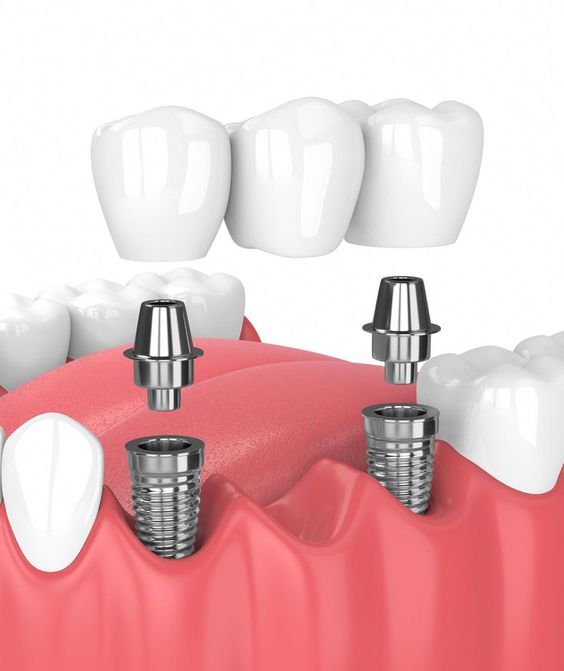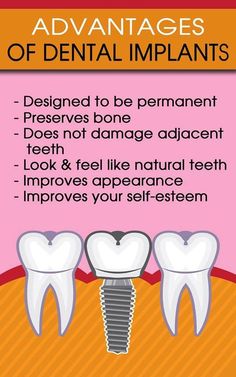Dental Implants
Dental implants are a major advancement in replacement of missing or damaged teeth. We have achieved expertise experience in implant dentistry. We look forward to welcoming you to become a member of a family of satisfied patients. At present we use only two famous world leading implant in our daily practice, One is from America and another is from Korea.
Implants are an investment in your overall health and quality of life, and can improve speech, chewing, appearance and provide peace of mind. Patients interested in dental implants should call for a consultation appointment. Each treatment is unique to the patient, so there needs to be an initial consultation. The consultation will include an examination; a panoramic x-ray; and a treatment plan. You will be given a copy of your treatment plan after the examination that will detail the costs of the recommended treatment.
A dental implant is a titanium post (like a tooth root) that is positioned into the jawbone beneath the gum line that allows your dentist to mount replacement teeth or a bridge into that area. An implant doesn’t come loose like a denture can. Dental implants also benefit general oral health because they do not have to be anchored to other teeth, like bridges
A dental implant is an artificial tooth root that is placed into your jaw to hold a replacement tooth or bridge. Dental implants may be an option for people who have lost a tooth or teeth due to periodontal disease, an injury, or some other reason.
Dental implants are another method of tooth replacement. In simple terms they are titanium rods or screws that are fixed to the jawbone. An extension is then secured to the implant and a new crown is created and placed to match the colour and contours of the existing teeth.


Stages of Implant Placement:
First phage: We will place the implant into the bone and cover it. This procedure will be carried out under local anesthetic. In some cases where there is not enough bone, a bone graft is needed before/during the implant placement. After the next two to six months, the implant will fuse with the bone to become solid. During the “healing period”, we will use a temporary fixed bridge or a removable denture to close the gap.
Second Phage: we will securely attach a precision fitting post into the healed implant. We will then, create the final new tooth crown.
Depending on your specific condition and the type of implant chosen, we will create a treatment plan tailored to meet your needs.
Indications:
- Replacing a Single Tooth If you are missing a single tooth, one implant and a crown can replace it.
- Replacing Several Teeth If you are missing several teeth, implant-supported bridges can replace them.
- Replacing All of Your Teeth If you are missing all of your teeth, an implant-supported full bridge or full denture can replace them.
Advantages:
Improved appearance: Dental implants look and feel like your own teeth. Because they are designed to fuse with bone, they become permanent. They can match the color of the natural teeth and they do not have the metal hooks that are used to keep dentures in place
- Improved speech: With poor-fitting dentures, the teeth can slip within your mouth, causing you to mumble or slur your words. Dental implants allow you to speak without the worry that teeth might slip.
Improved comfort: Because they become part of you, implants eliminate the discomfort of removable dentures.
- Easier eating: Sliding dentures can make chewing difficult. Dental implants function like your own teeth, allowing you to eat your favorite foods with confidence and without pain.
- Improved self-esteem.: Dental implants can give you back your smile and help you feel better about yourself.
- Improved oral health: Dental implants don’t require reducing other teeth, as a tooth-supported bridge does. Because nearby teeth are not altered to support the implant, more of your own teeth are left intact, improving long-term oral health. Individual implants also allow easier access between teeth, improving oral hygiene.
- Durability: Implants are very durable and will last many years. With good care, many implants last a lifetime.
- Convenience: Removable dentures are just that; removable. Dental implants eliminate the embarrassing inconvenience of removing dentures, as well as the need for messy adhesives to keep them in place.
Disadvantages:
- Cost : Dental implants are expensive. The cost of a single implant many times bigger than Dental Bridge or Denture.
- Surgery: Dental implants are a surgical procedure and any surgery carries some risk. There is a possibility of swelling or pain after getting a dental implant, although this should not last more than a few days.
- Replacing the Crown: The top part or false tooth of the implant is called the crown. It will have to be replaced after 10 or 15 years, although the implant itself will last longer.
- Quality : The quality of implants can vary depending on the dental professional that does it. It is important to take the time to find the experienced dentist for dental implant.
